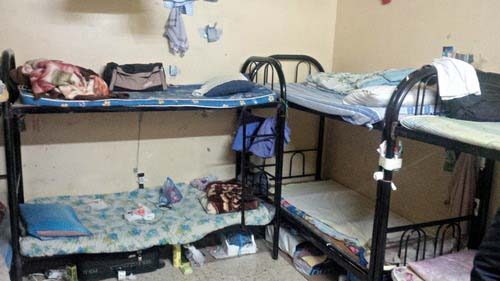Overcrowding and “unbelievably bad” conditions such as flooded bathrooms, dilapidated kitchens and workers sharing beds and/or sleeping on the floor are among some of observations labor activists made during visits to accommodation sites in Qatar this week.
“It was not a pretty sight,” said Atle Høie, international secretary of Norway-based trade union Fellesforbundet. Høie was one of 16 members of the Building and Wood Workers’ International who were in Qatar this week to investigate the living and working conditions of migrant workers.
BWI officials, comprised of delegates from nine European nations and two Asian ones, were invited to the country by Qatar’s National Human Rights Committee (QNHRC), which also organized many parts of the visit.
However, Høie and some of his colleagues also met with migrant laborers on their own and toured several labor camps, the specific locations of which he told Doha News he could not recall.
The visit comes as Qatar is in the international spotlight because it is hosting the 2022 World Cup tournament.
Rights groups are using the games to keep pressure on the country to improve its labor record, especially because some 1 million more construction workers are expected to move here in the coming years to work on World Cup-related projects, such as new football stadiums.
‘Disturbing evidence’
Living conditions in many of these camps were unhygienic, and some workers told the team that they wished they never left their home country due to their “sufferings” in Qatar.
After spending three days visiting construction sites and labor camps in and around Doha -– and being denied access to some – the group held a press conference this afternoon at the Best Western Hotel Doha to release its findings.
While noting that some projects had adequate health and safety provisions, BWI officials said that they observed “disturbing evidence of wrong practices” and a general “climate of fear” among migrant workers that keeps them from coming forward with complaints of mistreatment.
In a statement, BWI officials said:
“One worker in a slave-like situation is one too many. This is not acceptable and the plans and reforms presented by the authorities lack the urgency needed in this situation.”
Workers with complaints who were interviewed by the team said:
- Their passports were being withheld;
- Promises of wages, work hours and living conditions were unmet;
- They were in constant debt to recruiters and moneylenders;
- They lived in crowded and squalid camps; and
- They lacked a constructive mechanism for filing labour disputes and complaints because of the complexity of the Qatari justice system.
Turned away from Lusail
BWI officials also said they were denied access to the light-rail construction site in Lusail on Wednesday despite receiving prior authorization from one of the companies involved in the project.
According to BWI general secretary Ambet Yuson, the site manager contacted his supervisors and then told the delegates they required government authorization to visit the site.
Yuson said his team was able to visit the Msheireb construction site for an hour Thursday, two days after they first attempted to tour the project.
He said he was generally pleased with what he saw, noting that many health and safety measures were in place. But with only a “limited” amount of time at Msheireb, Yuson added he still had questions, such as learning about the composition of the project’s health and safety committee.
Speaking to reporters after BWI’s press conference, QNHRC chairman Dr. Ali Bin Samikh Al-Marri criticized BWI for telling Doha News that delegates were previously not able to enter Msheireb.
Speaking in Arabic through a translator, Al-Marri said correspondence confirming that BWI members would be allowed to access the site had been exchanged well in advance and that the visit was delayed to ensure safety measures to protect the visitors could be put in place.
He also emphasized his willingness to engage in dialogue with international bodies such as BWI:
“I hope that we will work quietly but effectively … on human rights, away from the backdrop of propaganda.”

Several BWI members publicly thanked the Qatari government for allowing them to conduct their inspections, noting some countries would not have permitted their visit.
Additionally, they highlighted the good working conditions at the Sidra Medical and Research Center construction project and an under-construction plant at Qatalum, a joint venture between Qatar Petroleum and Hydro Aluminium of Norway.
Høie said he was also encouraged by his meetings with the undersecretary of labor and members of the Qatar Foundation where they discussed standards for recruiting as well as living and working conditions.
“Most of the policy initiatives looked good,” he said, adding that enforcing and implementing the rules continues to be a problem. Beefing up the number of labor inspectors – there are reportedly only 150 for the entire country – would be an important step, he said.
Upon returning to Geneva, BWI officials will prepare a formal report and submit it to the International Labour Organization, a UN agency, FIFA officials, major global construction firms and international human rights organizations.
Yuson said he hoped to return to Qatar next year to conduct another round of inspections.
Here is the group’s full list of observations and recommendations:
Thoughts?
Credit: Top photo courtesy of BWI; second photo by Peter Kovessy








